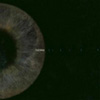 |
PLASTIKMAN
CLOSER
ALBUM NOVAMUTE, PLAYGROUND RELEASE:
OCTOBER 20, 2003 REVIEW: NOVEMBER 18, 2003
 |
The
man who brought you the seminal classic "Spastik" returns after
five years with the third and maybe final in the Plastikman trilogy "Closer".
And would you believe with the opening track "Ask Yourself",
you can actually hear the man himself, Richie Hawtin speak! Don’t
be fooled though, as this is Hawtin's Plastikman project, a guise designed
to focus on the dark and the minimal, so the voice you hear is actually
heavily distorted, to the point of inhuman feeling. And don’t expect
him to offer soothing words to ease this coldness, as the sample lyric
"Don’t ask me, ask yourself. I’m just the voice in your
head" attests to.
Musically
there is a logical progression from his former albums "Sheet One"
and "Consumed", though this is a much darker, even sinister
affair. Both of the first two tracks focus on the building up of atmospherics;
dense, claustrophobic sounds throbbing and churning away in the background,
punctuated by beat clusters and various sound effects that at times seemed
to gently waft into focus, and at others, as on "Mind Encode",
seem to buzz around your head like an angry synthetic bee.
This
album consists of only ten tracks, but weighs in at a hefty one and a
quarter hours, and it is this that is key to this album's success. Each
track is allowed time to develop, to breathe almost, giving each track
an organic, almost living quality - there is no attempt, or even need
to go for killer hooks. This can be seen with the track "Disconnect";
at first you have two single stabs, at slightly varied pitches, which
gradually grow closer together rhythmically, before allowing the beat
and finally the dark, oozing bassline to come and bring everything together.
Another
quality that you can do nothing but admire on this album is the way that
every sound is allowed the chance to stand alone, giving you the chance
to focus on each individual bleep, squelch and hiss, which in turn helps
you to appreciate what a master of the mix Mr Hawtin is. This is definitely
an album for all of those experimentalists who love the music of sound;
here every individual sound has its own character, its own place and its
own space, with no two sounds appearing to ever be alike - a world away
from the idea that music should be made up of tight repetitive beats and
sampled riffs and lines - faceless and identical.
For
those who feel that this album could be just too black for them, as the
cover art may suggest - you too can also listen closely without too much
fear, for there is humour to be found. Check out "Slow Poke"
with its dense, cloying atmosphere which suddenly is lightened with a
just-in-range mobile phone ring tone. Who said electronic music was humourless?
Each
track seems to get steadily more disjointed, more cinematic, more cavernous
- with sounds appearing to echo off one another, shifting, disappearing,
returning and mutating, as though the machines used to record these tracks
had learnt how to operate themselves, and decided to do exactly that.
By the time you reach track seven "Ping Pong" you realize you
could have quite easily spent the album so far daydreaming about aliens,
in fact one Alien in particular, such is the dark, brooding menace instigated.
"Ping
Pong" is a different beast altogether though. This being the most
upbeat track on the album (ie has some regular form of beat structure),
it leads you into a false sense of security, like seeing a light at the
end of a dark tunnel, only for the fuse to blow just as you're getting
near it, plunging you back into the darkness that is "Mind in Rewind".
"I
Don’t Know" finishes off the album, a track that hints slightly
back to the original formula of Plastikman circa 1993, bringing the trilogy
back almost full circle, with its trademark 303 and effects usage, though
the haunting voice remains to remind you that this incarnation is here
to stay.
As
the track draws to a close, you can’t help but wonder if this is
the end of Plastikman, the trilogy is complete, ten years have passed;
it is that thought which almost makes you feel as cold, disjointed and
melancholy as this album. We can only hope this is not the case, there
are still so many places to go, and only one Plastikman who can take us
there.
MIKE
WHYTE
|
AD
|